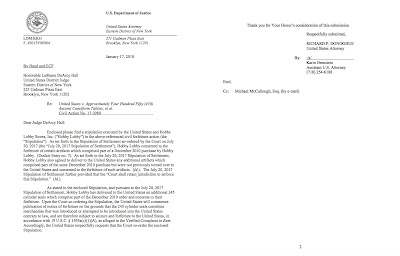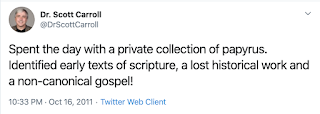Op/Ed By: Lynda Albertson
As the US press and social media came alive in condemnation as a result of
the Hobby Lobby smuggling case, I couldn't help but notice that while the hashtag #HobbyLobbyisISIS is noticeably attention-grabbing, (as well as probably inaccurate), the more important facet of the "is-that-object-looted" puzzle was still being overlooked.
I asked myself, instead of simply rewording the press release announcement released by the government, why hadn't US news organizations dug deeper into the development of the Green Collection in ancient art. Especially since everyone now seems hellbent, (excuse the pun) on crucifying the fundamentalist Christian collector or finding some way to tie Hobby Lobby to Da'esh.
This is a case that has been widely publicized since 2015, and it's not the only time
the Greens or their large
collection have come under scrutiny or been accused of acquiring objects through untrustworthy channels with illicit ties.
In June 2014 Dr. David Trobisch, Director of Collections for the Museum of the Bible even attended ARCA’s annual art crime conference where he heard concerns made by Dr. Roberta Mazza, a papyrologist and ancient historian from the University of Manchester about the Green Collection's unprovenanced papyrus fragments. Those fragments however were not mentioned in this current civil complaint.
While this US civil forfeiture case underscores that illicit traffic in cultural objects contributes to the despoliation of a country's ancient heritage and causes irreparable loss to the world's heritage knowledge, why is it then that the public only wakes up and takes notice when ISIS ties are tangentially inferred?
Are trafficked Middle East artifacts only worthy of the world's indignation when they are looted to fund terrorism?
As the general public responded to the press coverage over the last two days most of the grumbling I've come across was either ISIS-funding related or centered on whether or not the punishment fit the crime. I use the word "crime" here loosely because no criminal charges were filed for the looting and theft of the 450 ancient cuneiform tablets and 3,000 ancient clay bullae which ultimately were the subject of this civil forfeiture.
In civil cases, the object of the law is the redress of wrongs by compelling compensation or restitution. As those following this case closely are painfully aware, civil law deals with the disputes between individuals, organizations, or between the two, in which compensation can be awarded to the victim. Criminal law is the body of law that deals with crime and the legal punishment of criminal offenses.
A civil fine is not a criminal punishment.
Civil case fines are primarily sought in federal investigations in order to compensate the state for harm done to it, rather than to punish a wrongful conduct, something many like myself would have liked to have seen happen given the Green's less than stellar record when it comes to vetting antiquities for inclusion in their collection. In this case, Hobby Lobby only suffers so much harm as is necessary to make good the wrong they have done (to the state).
Civil penalties, in this case a $3M fine, do not carry any jail time or other legal penalties. This fact illustrates why no one from Hobby Lobby was criminally charged, despite the large number of objects seized and subsequently forfeited.
This may also explain the absence of any noticeable public remorse on Hobby Lobby's part for their role in this antiquities smuggling affair. The lack of regret can also be seen in the unrepentant statement by Hobby Lobby President Steve Green, in his company's press release after the federal civil ruling was publicized.
Was new to the world of acquiring these items? Did not understand the correct way to document and ship these items?
Let's look at his statements more closely.
While Hobby Lobby, may be "new" to the world of acquiring antiquities, the fact that it has purchased more than 40,000 objects since November 2009 does not in any way make it a neophyte collector of ancient art.
In addition to the cuneiform tablets seized in this well publicized case, the Green Collection already had in its possession
the third largest holding of cuneiform tablets in North America (over 10,000 pieces). This means Green and Hobby Lobby by proxy had ample prior opportunity to explore what could and should go on any customs declaration for objects that contain writing first developed by the ancient Sumerians of Mesopotamia between 3500-3000 BCE.
In 2010, a year before the seized cuneiform tablets arrived in Memphis, the Greens had also already consulted with Dr. Patty Gerstenblith, a cultural heritage law expert with DePaul University 's College of Law, about import restrictions for ancient antiquities who is reported to have advised them about their need for deeper due diligence in their collecting. Given Gerstenblith's impeccable familiarity with the cultural heritage law, it can be assumed that the Greens as collectors were not as ignorantly naive to the road they were embarking down as the firm's press statement this week seems to imply.
But setting aside the intricacies of import and customs documentation specifically related to ancient antiquities coming from Iraq, Hobby Lobby itself has some 32,000 employees, 750 stores in forty-seven states, and
$4 billion in yearly revenue, much of it based on imported items.
When importing merchandise from foreign countries Hobby Lobby is fully aware there are certain trade laws and regulations, and that U.S. Customs oversees the compliance of those laws. They even have an international department responsible for training and compliance to ensure the import process go smoothly, not to mention a manual outlining laws and regulations, valuation, assists, and country of origin requirements
which can be downloaded here.
So to imply to the public that Hobby Lobby "imprudently relied on dealers and shippers who, in hindsight, did not understand the correct way to document and ship these items" seems a bit unapologetic coming from an apologist.
Especially given Green's business thrives on supply-chain distribution members in its shipping department who would have to have, given the large scale operation of receiving imported cargo from across the globe in support of Hobby Lobby's national operations, sufficient knowledge of what the legal requirements are for import. If they didn't, they certainly knew who to ask.
As I have mentioned in a previous post, the estimated 40,000+ objects in the Green Collection equates to acquiring 6,666 objects per year or collecting a whopping 18 new objects per day. Compare that acquisition rate to the number of employees working on the Green's or the Museum of the Bible's payroll who are tasked with historic object provenance and one can easily surmise that an object's ethical collection history has never been either group's overriding priority.
Emphasis instead has been on filling the Museum of the Bible, Washington DC's about-to-be-opened 430,000-square-foot, eight story massive red brick museum located over the Federal Center SW Metro station. To put that into perspective, one NFL football field is 57,600 square feet. The Museum of the Bible has seven and a half football fields of space it needs to fill.
Given the scale of archaeological theft in biblical area source countries and the number of objects with questionable origins which have already been identified by various researchers following the Green Collection prior to this forfeiture, it's time for Hobby Lobby's founders to do more than just open their wallets, purchase, and if caught, pay civil fines and forfeit the objects in question.
Opening their wallets has been the crux of the problem, as the Green's appetite for unprovenanced antiquities, and the profits to be had from this appetite, have likely been a motivating factor for others to loot, thereby destroying whatever context the objects may have had.
It's time for the Greens to fulfill the promise previously made by their employee.
In 2014 the director of Collections at the Museum of the Bible, David Trobisch, informed Dr. Roberta Mazza that the Green Collection was going towards full digitisation and open access. This has yet to happen.
They should also make every effort, before making any further acquisitions, to ensure that the objects they are purchasing have been legally obtained and been legally exported from their country of origin.
If the Greens truly want to make amends, they should fill their future Museum of the Bible with acquisitions collected ethically, and make the details of their past purchases open to researchers and investigators so that they can start to set things right by restituting any objects previously purchased without sufficient moral and ethical consideration.
Exodus 20:15 and 17 King James Version (KJV):
“Thou shalt not steal."
“Thou shalt not covet thy neighbour's house, thou shalt not covet thy neighbour's wife, nor his manservant, nor his maidservant, nor his ox, nor his ass, nor any thing that is thy neighbour’s.”
I think that includes cuneiform tablets, clay bullae, incantation bowls and papyrus fragments.
 Antiquities; Looting; Smuggling; Collecting; Collections,Collecting,collecting history,conservation,Green Hobby Lobby,illicit trafficking,Museum of the Bible,Scott Carroll. ethical collecting
Antiquities; Looting; Smuggling; Collecting; Collections,Collecting,collecting history,conservation,Green Hobby Lobby,illicit trafficking,Museum of the Bible,Scott Carroll. ethical collecting
 1 comment
1 comment






















